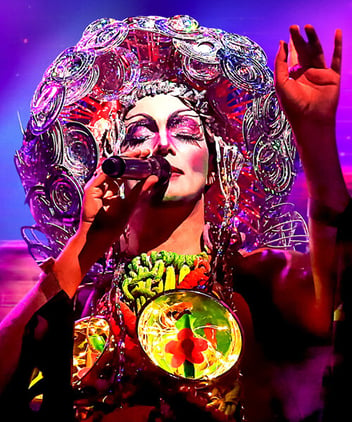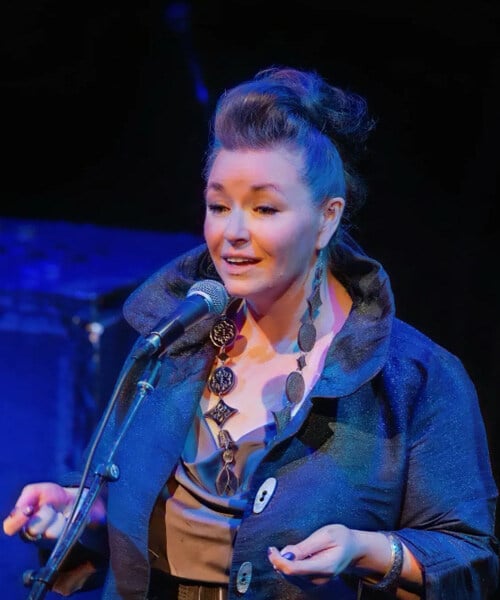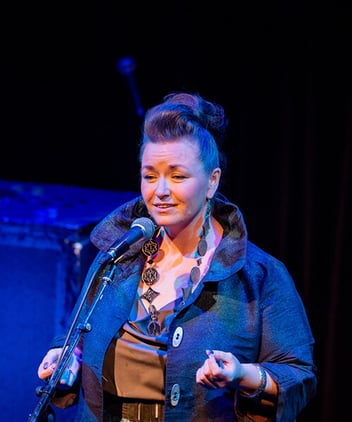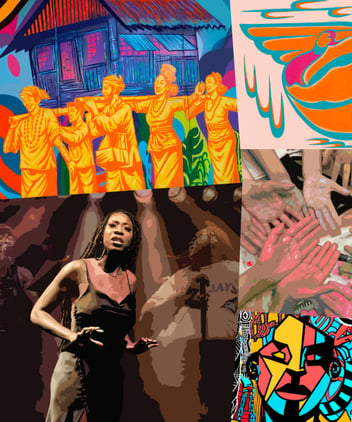
Ten years ago, I was asked if I would fundraise in the arts sector and my immediate response was "No!" Having spent more than a decade fundraising for social service agencies tackling addictions, domestic violence, homelessness, and poverty, I couldn’t see the urgency in fundraising for the arts. I was wrong.
Ironically, I come from a long line of authors, artists, and storytellers, and was recently appointed Calgary’s seventh Poet Laureate. Today, I have the privilege of leading Calgary’s longest-running queer arts organization – Calgary Queer Arts Society. I believe art, culture and kinship are vital in reducing suffering, helping us feel less alone, and addressing many injustices in our world.
In the intricate web of human relationships, kinship and art making are essential for community building and cultural transformation. Art acts as a bridge, reducing isolation and connecting disparate communities through shared experiences and emotional resonance. On the journey towards genuine inclusivity, kinship often proves more potent than mere allyship.
Art reflects society, showing us who we are and who we might become. As a queer artist and poet, I see this reflection colored by struggles and triumphs in a world that often marginalizes our identities. Creating art transforms our lived experiences into a universal language, fostering empathy and understanding. Art making is an act of resistance and resilience, a testament to the enduring spirit of those who refuse to be silenced, and a space to explore our similarities and differences.
The importance of art in building cultural bridges cannot be overstated. When communities with overlapping lived experiences come together through art, we find common ground and shared narratives. These artistic exchanges cultivate empathy and solidarity, breaking down barriers. The intersectional nature of art helps create a more inclusive dialogue, where diverse voices are not only heard but celebrated.
Within the landscape of cultural transformation, kinship trumps allyship. While allyship is crucial for advocating for marginalized groups, it often remains surface-level. Kinship is rooted in deep, reciprocal relationships that go beyond mere support. Kinship embodies a shared sense of responsibility and interconnectedness, where the struggles and joys of one are felt by all. This profound connection fosters a more genuine and lasting commitment to change.
It's important to recognize that art making has pitfalls. The evolution of art shows how past generations pushed boundaries in ways that, while groundbreaking at the time, might be viewed as prejudicial today. For example, the Dada movement of the early 20th century rejected traditional aesthetics and societal norms but was tinged with misogyny and cultural appropriation. As we learn from these contexts, our community building evolves, striving to broaden our sense of inclusion.
The queer art movement of the late 20th century, especially during the AIDS crisis, illustrates how art can drive cultural transformation. Artists like Keith Haring and David Wojnarowicz confronted the epidemic and its stigmas, creating powerful visual narratives that demanded attention and action. Haring once said, "Art is nothing if you don’t reach every segment of the people," emphasizing art's democratic and inclusive potential. These artists were not just allies; they were kin, deeply embedded in shared community.
Today, our understanding of inclusion continues to expand as we build upon the legacies of those who came before us. We are more attuned to the nuances of identity and the importance of intersectionality. As a queer poet and artist, I see my work as part of a continuum that honors past struggles while advocating for a more inclusive future. My art is an invitation to dialogue, recognizing the interconnectedness of our experiences, and I strive to bring this to my role with Calgary Queer Arts.
To quote the iconic artist and activist Audre Lorde, "It is not our differences that divide us. It is our inability to recognize, accept, and celebrate those differences." In this spirit, art and kinship come together as powerful catalysts for cultural transformation. By embracing our interconnectedness and celebrating our diverse identities, we can create a world where everyone is seen, heard, and valued.
My journey as a queer poet, artist, and community advocate is about weaving together the threads of kinship and art to foster a more inclusive and empathetic society. Art and kinship have saved me in times of immense struggle; art remains a vital bridge between communities, and it is the deep, reciprocal connections of kinship that help us feel less alone. As we learn from the past and build for the future, our collective commitment to inclusion and understanding will continue to grow, broadening the scope of our shared humanity. If asked today to choose between social service or arts fundraising, I’d say both matter equally, but art, culture, and kinship insulate us from life's challenges in the first place.
Shone Thistle
Shone Thistle is a Queer poet and multidisciplinary artist. Once described as a “feminist folk poet,” Shone’s poetry credits range from radio to jazz concerts, festivals to conferences. Shone played an integral role in brokering Calgary’s first permanent Pride and Trans crosswalks and was an active voice in the establishment of Canada’s strongest municipal bylaw against conversion therapy. Her superpower is taking disparate content and weaving it into a cohesive story.




